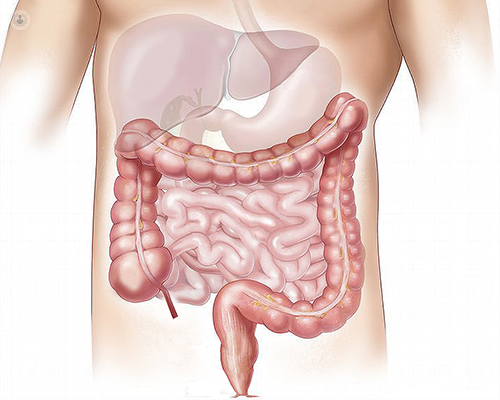Colonoscopy: An expert insight
Written by:A colonoscopy is a medical procedure used to examine the inside of the colon (large intestine) and rectum that has both diagnostic and preventive purposes.
Here, Mr Parv Sains, renowned consultant surgeon, provides an expert insight into the procedure.

What are the most common reasons patients require a colonoscopy?
Primarily, colonoscopies are used to exclude conditions like bowel cancer and polyps, as well as inflammatory bowel disease (including Crohn’s disease and ulcerative colitis) and chronic diarrhoea. Symptom-wise, patients with these conditions will normally present with changes in bowel habits. A change in bowel habit can manifest as loose stools or frequent passing of stools, or, as rectal bleeding which can be fresh blood or more worryingly dark blood.
In some cases, patients undergo a colonoscopy if there is a family history of colorectal cancer or bowel polyps.
Nowadays, however, many colonoscopies are performed for bowel cancer screening. During bowel cancer screening, patients are asked to use a faecal immunochemical test (FIT) to collect a small sample of stool, which is then sent to a laboratory to be checked for microscopic amounts of blood. It’s important to understand that a positive FIT test doesn’t necessarily indicate the presence of bowel cancer. Still, a colonoscopy is required to make sure that the cause of the bleeding isn't cancer-related.
What can patients expect on the day of the procedure?
The pathway to a colonoscopy starts a couple of days before the procedure, in the pre-consultation. During this appointment, patients are informed about the procedure, as well as any risks and potential complications, and asked for their informed consent.
Patients are then given a laxative in the form of a bowel preparation to clear out the large bowel. This preparation needs to be mixed into a drink, and be taken the day before or on the day of the actual procedure.
During a colonoscopy, a flexible tube with a small camera (colonoscope) is inserted into the rectum and advanced through the colon. This allows the specialist to visually inspect the lining of the colon for abnormalities such as polyps, inflammation, or signs of cancer. If any polyps are found at the time of the colonoscopy, we remove them. Likewise, if any biopsies need to be done, we perform them.
A colonoscopy is typically performed as a day-case procedure, which can take place in the morning or in the afternoon. Patients who are very anxious or who had difficult colonoscopies in the past are offered deep sedation, which is a mixture of pethidine or fentanyl with midazolam, to ensure their comfort. Some patients will only have entonox or gas and air, which is nitrous oxide.
Is it painful? How long does a colonoscopy take to perform?
A colonoscopy can take between 30/40 minutes or longer, depending on the patient. Some colons are longer, twisted, and with more angles; as the scope goes around these corners, the contact between the scope and the lining can cause a little pain to the patient. Some patients do experience discomfort, but the majority tolerate it really well.
How much time is needed to recover after a colonoscopy?
Regardless of the type of sedation, patients are typically back up on their feet within the hour. Patients are allowed to eat and drink almost immediately, but they shouldn’t drive or work for at least 24 hours after.
What are the next steps following a colonoscopy?
Most of the time, we don’t find anything worrying during a colonoscopy, and instead find haemorrhoids as the underlying cause of bleeding for instance. Follow-up will then involve treatment for the haemorrhoids.
However, if polyps were discovered or if a biopsy was performed, then there’s normally a follow-up two weeks after the colonoscopy with any histology of biopsies or polyp results.
To schedule a consultation with Mr Parv Sains, head on over to his Top Doctors profile today.


